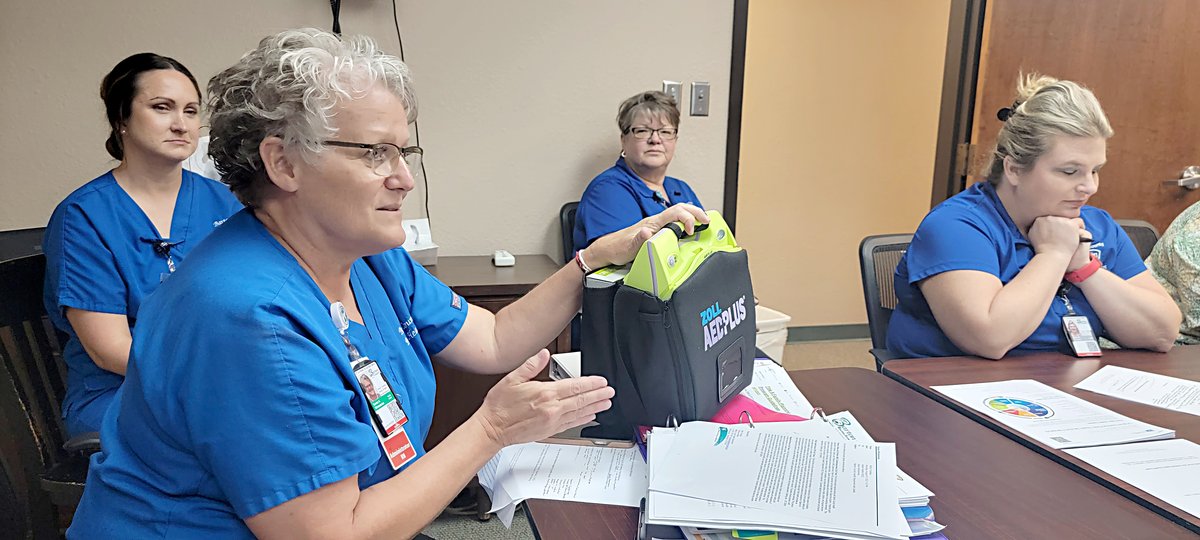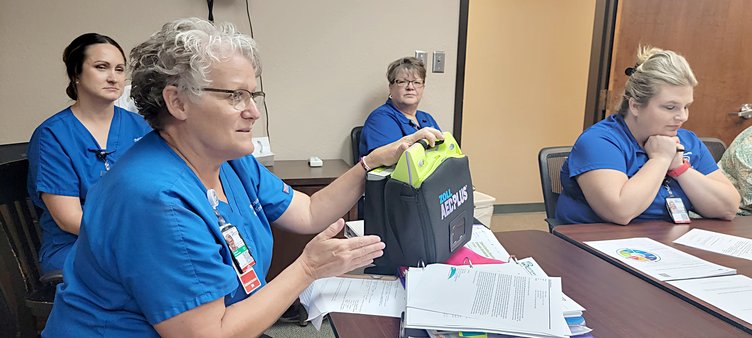Keeping busy
When addressing the Barton County Health Department Advisory Board meeting Tuesday morning, Health Director Karen Winkelman outlined what the board had done over the past month. Highlights included:
• Participating in the community baby shower, the Barton County Fair and the Midwest Cancer Screening.
• Conducting school inspections of all the schools in Barton county K-12.
• Talking about KanCare expansion and the Community Health Needs Assessment.
• Applying for the Workforce Development Grant, which would be for $117,000 over four years.
• Discussing open positions. These include a WIC clerk and two nurses.
Tuesday marked the first time Barton County commissioners attended a meeting of the Barton County Health Department Advisory Board, a state-mandated body comprised of medial professionals that consults with the department on policy matters.
Health Director Karen Winkelman used the joint meeting at the Health Department office to explain he board and tout its successes. Commissioners attended as the county’s Board of Health.
“In the past three years, our story’s been told for us, which hasn’t always been in a positive light, but we’ve done the work,” she said, harking back to the COVID-19 pandemic years. “Our goal now is for us to tell our story.”
She should know. Winkelman, an 26-year department veteran, assumed the directorship three years ago just as COVID swept in (she can recall the exact time an date she took the job).
Attendees also toured the department office, a former hardware store, made up of a labyrinth of offices, exam rooms and other spaces. They also walked through the department’s mobile outreach trailer (a modified camper).
The advisory board
“The advisory board was formed several years ago,” Winkelman said. It was a state requirement after the department received it’s Family Planning Grant.
Directed by Winkelman, it is comprised of five to nine members serving uncompensated terms. Members include doctors, veterinarians, nurses, other health professionals and representatives of the public at large.
All fields are represented now, but there are openings on the board, she said.
It’s been a very interactive group and Winkelman has appreciated its efforts.
Board members veterinarian Mike Malone and Krista Smith echoed this.
“Public health is a different type of medicine.” Malone said. It takes all medical disciplines coming together and “being on the same page.”
“Over the years, the evolution of the this advisory board and of the Health Department has become so much more global, so much more all inclusive, and it’s been amazing the things that we can do” from immunizations to taking on mental health and substance abuse.
She used to see the Health Department as serving only the indigent. But, now she’s found that is not the case, and in fact, comes in for services.
The Board of Health
The commissioners make up the Board of Health. “During COVID, I came before you many times with COVID changes and COVID quarantines, isolations, all of those kinds of things,” she said.
Winkelman serves as the local health officer. However, under state law, in counties with fewer than 100,000 residents (like Barton), there must be person licensed to practice medicine designated as a consultant, a role is filled by Great Bend physician Dr. Jonathan Pike who is paid a monthly fee.
“I visited with him back and forth a lot through COVID,” she said. Now, he is just kept in the loop.
There are other physicians who sit on the board or consult on an occasional basis.
“My role is to keep you all informed of what happens here and to keep you up to date on what is coming forth from the Kansas Department of Health and Environment,” she said.
Working together
“I think if anything, through COVID we realized the importance of working with the community, and also with our county departments,” Winkelman said. Now, some of her staff is helping scan documents for the Appraiser’s Office.
As an example, she mentioned the KDHE $30,000 ELC Grant for Mental Health the county received. Part of a joint effort with the Great Bend-based Center of Counseling and Consultation, it funds a the jail inmate mental health program.
“It’s been very effective,” said board member Jennifer Schartz. She said 50% of the inmates who sought help continued with care after being released.
The department also received a grant to purchase three automated external defibrillators for the department. These are loaned to the Barton County Sheriff’s Office for use in patrol cars since the deputies are often the first on the scene when someone is in need.
And, Winkelman’s department helped the BCSO get doses of NARCAN, the nasal spray used as an opioid overdose treatment.
A countywide department
“If anything is put on my tombstone, it would be this is the Barton County Health Department, not the Great Bend Health Department,” Winkelman said. They make every effort to reach out to all the communities.
“They fell kind of like they’re out in the boonies, like nobody notices them and the services don’t reach them,” she said of the smaller towns. “I want to get rid of that.”
The department now has a camper trailer it uses for outreach services.
“I am grateful to work for Barton County,” she said. When she attends meetings around the state, she hears of other counties where such collaboration does not take place.





